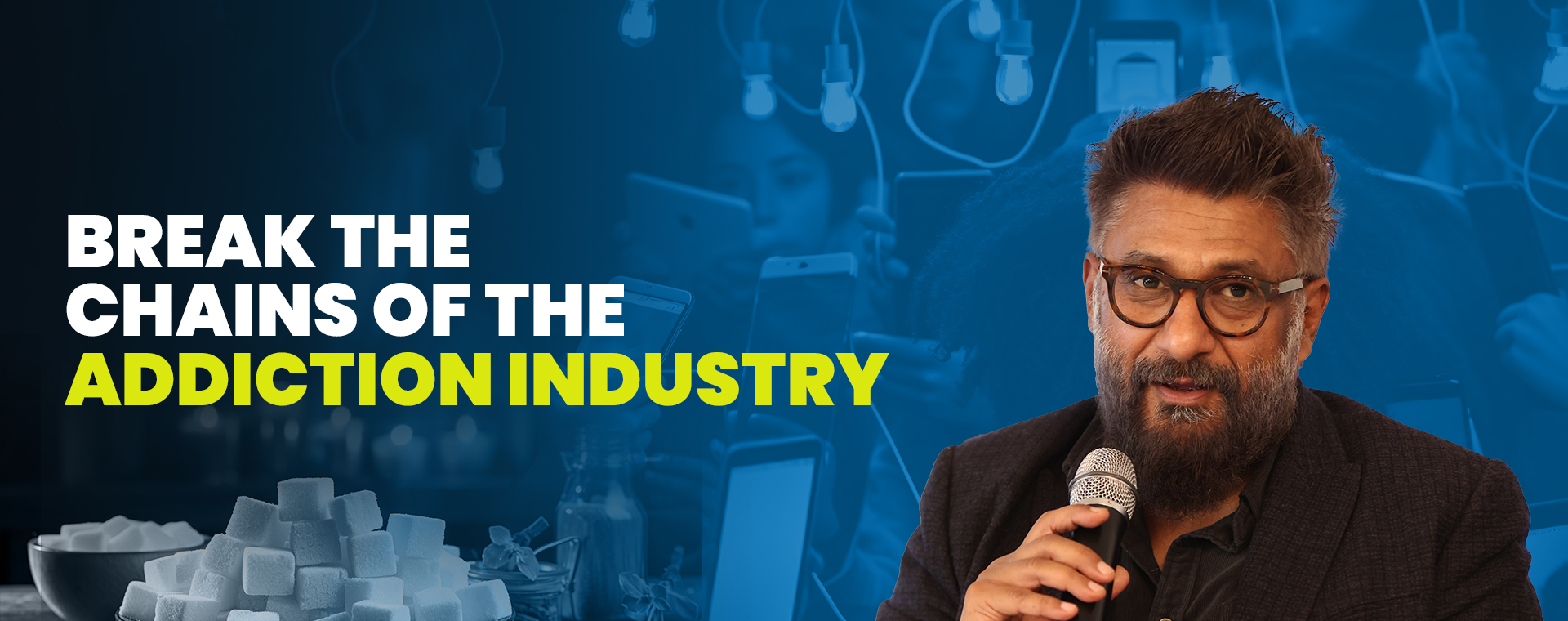

Breaking the Chains: Moving Away from Addiction Industry Towards Creative Consciousness
Step off the consumer carousel and into a world of mindful choices.
In today’s hyper-consumerist society, almost every brand is engaged in promoting what could arguably be termed as the three most formidable enemies of humankind: sugar, social media/entertainment, and super-sexualization. These elements, prevalent across various platforms and products, share a common, insidious thread—addiction. Companies are perpetually crafting new legal strategies to hook consumers, making the concept of addiction not just a health concern but a deliberate outcome of modern marketing practices. Why else would individuals find themselves inexplicably drawn to utility-based apps like Amazon, purchasing items they hardly need? This blog delves into the mechanics of the ‘Addiction Industry’ and how it’s shaping our lives, behaviors, and even our very thoughts.
The Cycle of Addiction
At the core of this addiction web lies sugar, an ingredient we consume in forms we’re often oblivious to. Its effects are far-reaching, contributing to a cycle of lethargy and increased susceptibility to further addiction. This lethargy, in turn, feeds into the endless consumption of social media and entertainment, platforms designed to capture and hold our attention for hours on end. What’s more, the content delivered through these channels is increasingly super-sexualized, creating unrealistic expectations and desires that, when unmet, lead to stress and dissatisfaction. This vicious cycle sees individuals trapped in a loop of consumption, addiction, and mental health deterioration. At the same time, original and critical thinking dwindles away.
The Axis of Addiction
| Enemy of Humankind | Description | Impact on Society |
|---|---|---|
| Sugar | Ubiquitous in our diet, often hidden, sugar fuels a cycle of craving, lethargy, and further addiction. | Increases health issues; diminishes overall productivity and vitality. |
| Social Media/Entertainment | Platforms are designed to captivate our attention, often leading to excessive consumption. | Erodes attention spans; replaces meaningful interaction with superficial engagement. |
| Super-sexualization | Content that emphasizes and exaggerates sexual themes, creating unrealistic expectations. | Distorts self-image and expectations; fosters dissatisfaction and stress. |
The Cycle of Dependency
- Initiation: Consumption begins innocently— a sugary treat, a scroll through a social media feed, a movie.
- Habituation: What starts as occasional indulgence becomes a regular daily routine.
- Addiction: The need becomes compulsive, driving behavior despite knowing the adverse effects.
The Death of Critical Thinking
As this cycle intensifies, so does its impact on our ability to engage in original and critical thinking. The constant barrage of addictive content and products dulls the mind, slowing down essential faculties and leaving individuals feeling helpless and out of control. This lack of control extends to personal behavior and thought processes, fostering feelings of loneliness, victimization, and, ultimately, anger. The result is an individual who blames external factors for their discontent, spiraling further into stress, anxiety, chaos, conflict, and even depression. This emotional turmoil then fuels the cycle of addiction, driving individuals back to sugar, escapism, and the pursuit of unattainable desires.
Breaking Free from the Addiction Industry
The antidote to this pervasive issue lies in a pivotal question: “Do I really need this product?” This query challenges the foundation of hyper-consumerist and exploitative capitalism, urging individuals to reassess their consumption habits and the actual necessity of the products and content they engage with. By answering this question honestly, one can eliminate the majority of unnecessary possessions, apps, and subscriptions cluttering their lives. However, if letting go proves difficult, it serves as a stark indication of one’s entanglement in the web of the ‘Addiction Industry.’
1. Awareness: Recognize the signs of addiction in your daily habits.
- Excessive screen time
- Cravings for sugary foods
- Discontent stemming from media consumption
- Needs vs. Wants: Distinguish between essential needs and momentary wants.
- Long-term Satisfaction: Consider if this will bring lasting satisfaction or temporary pleasure.
- Digital Detox: Allocate specific social media and entertainment times, gradually reducing usage.
- Dietary Changes: Identify hidden sugars in your diet; opt for whole, unprocessed foods.
- Content Choices: Be selective about your content; seek quality over quantity.
- Find healthier alternatives for fulfillment—exercise, reading, hobbies, or leisure time in nature.
- Share your goals with friends or family; consider joining support groups for accountability.
2. Questioning: Before engaging with a product or content, ask, “Do I really need this?”
3. Detoxification Steps:
4. Replacing Habits:
5. Building a Support System:
The Path to Creative Consciousness
Recognizing the trap set by the Addiction Industry is the first step toward reclaiming control over one’s life and choices. It involves questioning the necessity of our consumption habits and actively seeking out and fostering environments that encourage critical thinking, mindfulness, and genuine human connection. By doing so, we can begin to disentangle ourselves from the cycle of addiction and move toward a state of creative consciousness, where our actions are informed by intention and purpose rather than compulsion and habit.
Conclusion
The Addiction Industry thrives on our complacency and unexamined consumption habits. By promoting sugar, social media/entertainment, and super-sexualization, it seeks to trap individuals in a cycle of addiction that stifles originality, critical thinking, and personal agency. Breaking free from this cycle requires introspection, mindfulness, and a critical reassessment of our needs versus wants. In posing the fundamental question, “Do I really need this product?” we challenge the tenets of hyper-consumerism and pave the way toward a more mindful, intentional, and creatively conscious way of living. As we navigate the complexities of the modern world, let us strive to be masters of our choices, champions of our mental health, and architects of a life defined by purpose rather than addiction.






